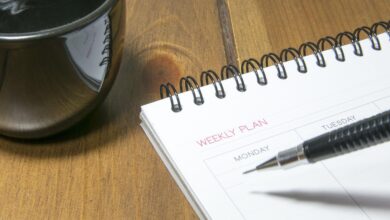
How a Planner Can Help You Prioritise Your Tasks
In today’s fast-paced world, the challenge of managing tasks effectively can often feel overwhelming. With multiple responsibilities at work, home, and in our personal lives, it is easy to fall into chaos. Fortunately, tools such as planners can significantly enhance our capacity to organise and prioritise tasks efficiently. This article explores how a planner can be instrumental in helping you prioritise your tasks, leading to greater productivity and reduced stress.
Understanding the Importance of Task Prioritisation
Before delving into the mechanics of using a planner, it’s essential to comprehend why task prioritisation is crucial. Life presents us with numerous tasks, each with varying degrees of urgency and importance. Effectively prioritising these tasks can lead to improved efficiency and ensure that we focus on what truly matters.
Prioritisation encourages you to consider deadlines, the potential impact of each task, and available resources. By distinguishing between what is urgent and what is important, you can make informed decisions. This helps in avoiding procrastination and ensures that critical tasks are completed promptly.
The Role of a Planner
A planner serves as a tangible or digital tool to outline your tasks, appointments, and deadlines clearly. It allows you to visualise your commitments and organise your thoughts in a structured way. Here are several key ways in which a planner can aid in prioritising your tasks:
1. Visual Organisation
One of the most significant advantages of using a planner is the ability to see all your tasks in one place. Whether it’s a physical notebook or a digital app, planners offer a visual representation of your assignments. This visual aspect can make it easier to gauge your workload, identify overlapping tasks, and spot potential conflicts in your schedule.
By laying out your tasks, you create a roadmap for the day, week, or month. This organisation allows you to assess where your time is being spent and adjust your priorities accordingly. Are you dedicating too much time to less critical tasks? If so, a planner can help recalibrate your focus.
2. Categorisation of Tasks
Planners provide an excellent opportunity to categorise tasks based on their nature and urgency. You might create categories such as ‘urgent and important’, ‘important but not urgent’, ‘urgent but not important’, and ‘neither urgent nor important’. This method, sometimes known as the Eisenhower Matrix, clearly ranks tasks and guides you in deciding where to direct your energy.
By categorising tasks, you can first tackle those that will yield the most significant results, often leading to a sense of accomplishment and motivating you to continue with the rest of your duties.
3. Setting Realistic Deadlines
In a planner, it’s not just critical to note tasks; setting realistic deadlines is equally important. Having a timeline encourages accountability and creates a structured approach to completing tasks. When deadlines are entered into your planner, they become tangible, reminding you of what needs to be accomplished and by when.
This practice not only keeps your priorities in check but also helps alleviate the pressure of last-minute work. By giving yourself clear timeframes, you have the opportunity to plan tasks in smaller, manageable chunks. This, in turn, makes the completion of larger projects less daunting.
4. Regular Reviews
Consistency is key to effective task management. A planner encourages regular reviews of your tasks and priorities. This might involve setting aside time weekly, or even daily, to evaluate what you have accomplished and what remains on your list.
During these reviews, reflect on whether your current priorities remain aligned with your goals. Are there new responsibilities you need to account for? Have any tasks become more urgent since you last reviewed your planner? Regular assessments keep your task list dynamic and responsive to changing circumstances.
5. Enhanced Focus
With the digital age providing endless distractions, maintaining focus can be challenging. A planner acts as a dedicated space where you can concentrate solely on your tasks. When you sit down to work with your planner in front of you, it sends a signal to your brain that it is time to focus.
In addition, knowing that you have a structured plan can reduce anxiety, allowing you to devote your mental energy to completing tasks rather than worrying about what you might forget. A clear outline of priorities enables you to channel your efforts and maintain concentration.
6. The Power of Time Blocking
Time blocking is a technique where you allocate specific time slots to work on particular tasks. A planner simplifies this process by allowing you to visually block out periods during which you’ll commit to focused work on your most important tasks.
By explicitly designating time in your planner, you create boundaries around your productivity. This practice not only aids in prioritisation but also enhances time management, as it encourages you to stick to your planned schedule and reduces the likelihood of multitasking.
7. Tracking Progress
Using a planner enables you to track your progress over time. Not only can you see what you have accomplished, but you can also assess how effectively you have prioritised. This assessment can inform future decisions and help you refine your approach to task management.
Such tracking can reveal patterns, such as periods of high productivity or recurring tasks that consistently take longer than anticipated. Understanding these trends allows you to adjust your priorities or strategies, making you better equipped to manage your time in the future.
8. Setting and Reviewing Goals
Planners often provide sections for long-term and short-term goal setting. Having a clear understanding of your objectives can significantly influence how you prioritise tasks. A planner encourages you to align daily tasks with your broader goals, ensuring that each step you take is purposeful.
Regularly reviewing these goals within your planner allows you to gauge your progress and adjust your efforts accordingly. You can ask yourself questions like: Are my priorities still aligned with my goals? What tasks can I delegate or deprioritise to focus more on what truly matters?
9. Reducing Overwhelm
A significant advantage of using a planner is its ability to reduce feelings of overwhelm. When faced with numerous tasks, it is common to feel anxious about where to start. A planner provides clarity and structure, allowing you to break down larger tasks into smaller, more manageable parts.
This method of deconstruction not only makes the tasks less intimidating but also allows you to celebrate small victories as you complete each segment, thus fostering a positive mindset. The act of writing tasks down also helps externalise mental clutter, giving your brain a break from trying to track everything internally.
10. Encouraging Accountability
Lastly, a planner inherently fosters a sense of accountability. By noting your commitments and deadlines, you create a contract with yourself to follow through on your obligations. This commitment becomes particularly important when working towards personal or professional goals.
When you see your tasks laid out in front of you, the motivation to complete them often intensifies. Additionally, if you share your planner with colleagues, friends, or family, it can create an external layer of accountability, further reinforcing your commitment to your priorities.
Conclusion
In summary, a planner is not just a simple tool for noting tasks; it is a powerful ally in the battle against overwhelming responsibilities. By offering organisation, visualisation, and a structured approach to managing tasks, a planner empowers you to prioritise effectively.
Harnessing its full potential can lead to improved productivity, enhanced focus, and ultimately, a more balanced life. Whether you choose a traditional paper planner or a digital counterpart, the key lies in consistent use and adaptability to your unique needs. By integrating a planner into your routine, you will find yourself better equipped to navigate the complexities of modern life with renewed clarity and confidence.





